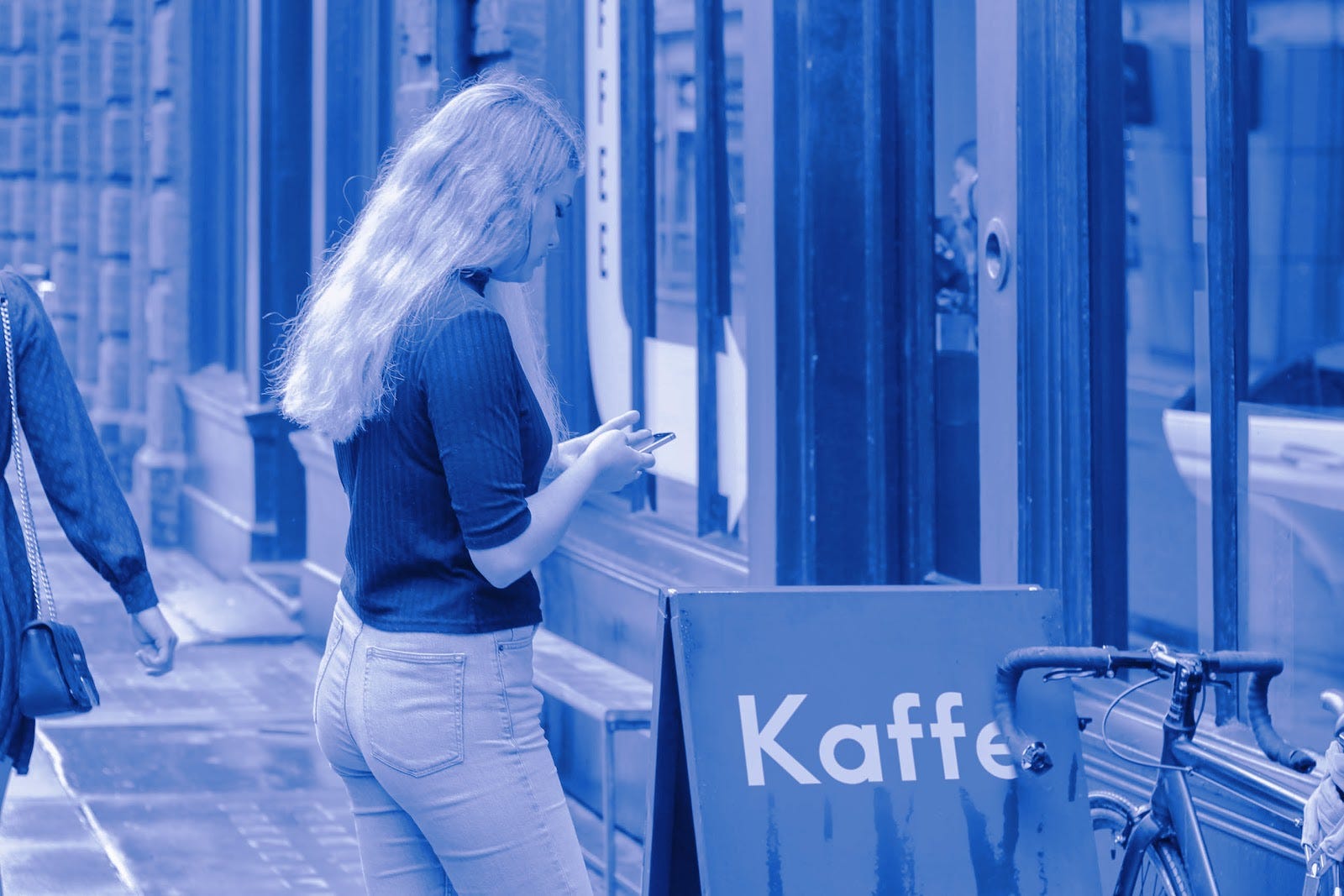
“God, I’m looking terrible today, damn hay fever!” Elin thought as she caught her reflection in the unresponsive black screen. “Just my luck, I probably won’t even be able to pay for breakfast!” Elin stared blankly into the camera above the kiosk display, hoping desperately that it would confirm facial recognition, she just needed to grab her coffee and dash to her meeting.
She rubbed her bloodshot eyes and widened her gaze. She relaxed as the familiar ‘thumbs up’ emoji appeared on screen to confirm her payment.

The subtle confirmation had become so ubiquitous that in the two years since the State had implemented the ‘eKrone’, people had taken to referring to making payments or transfers as ‘Thumbing’. A range of small financial startups had taken on the image and named themselves after the omnipresent symbol — ThumbFlip, GreenThumb, ThumbPal were all popular payment platforms. In restaurants, customers had taken to asking for the cheque by giving the waiters a ‘thumbs up’ gesture instead of the traditional mime of scribbling with a pen in the air.

Elin dashed to the subway and hopped on the train, her phone buzzed in her pocket and she knew her fare had been automatically deducted, one of the huge network of cameras would have captured her image multiple times on the way into the station. There was something pavlovian about the payment confirmation alerts — either a feeling of annoyance when paying begrudgingly for necessities, or a rush of endorphins when purchasing those new shoes you’d wanted.
Elin looked up from her phone, surveying the train carriage. As always most had their necks craned over their phones scrolling and swiping. Reading transaction notifications had become a substitute for compulsive email checking. Now that everyone’s financial lives were easily trackable and managed from a single platform, many people had become somewhat obsessive about managing their money. The same had been true years earlier with the rise of fitness trackers, the fit got fitter and the unfit simply felt guilty.
Elin reached her stop, exited the train and climbed up the stairs and out into the hazy Stockholm summer sunshine. She glanced down at her phone, she had 5 minutes until her meeting. She’d been preparing and rehearsing her pitch for weeks.
“You’ve got this,” she coached herself rather unconvincingly, her nerves getting the better of her. Her friends had frequently tried to convince her that social or peer-funding was a good option but she had never been entirely comfortable with relying on her friends and her extended network for money. She had reluctantly posted her concept pitch to her financial social network to raise funds but she didn’t hold out much hope. These days using a financial social network was as common as using Facebook or LinkedIn. Many trusted their financial network more than a large bank and preferred to save on fees and charges. Maybe she was a little old fashioned but she still sought validation for her idea from a larger, more established source.
Kisel Kaptial was one of the top VCs in Europe, well technically the London based VC couldn’t strictly be included in a list of European companies post-Brexit. A European head office in Stockholm made sense, it had long been a hub for established tech players like Spotify and iZettle whilst also hosting a thriving startup scene.

Elin walked into the cool air conditioned lobby of Kisel Kapital’s office. As expected it was calm and minimal — white walls with polished concrete floors and bleached wood benches. The stock markets and current eKrone exchange rates were projected onto a large wall alongside TechCrunch headlines and other new tickers.
Her phone buzzed in her pocket, she checked the notification and was pleasantly surprised to see a monthly payment from her bank. It still felt odd having the bank pay her money rather than vice versa. It had barely been a year since legislation had been put in place to put user’s data back in their own control. Due to years of growing public pressure, the government now required any company using user data for profit to rent it from the end user for a small fee. While users could in theory keep their data private, most were happy to forgo some privacy in return for a small monthly payment. Banks offered to act as an agent to collect the multitude of small fees from the many parties that rented customers’ data and in turn took a small percentage fee on top. As an educated, successful and well connected entrepreneur, Elin’s data was more valuable than most and her monthly payments were often not insignificant.

“Hej, you must be Elin,” a thirty-something man smiled, dressed in the prerequisite uniform of black Acne jeans and shirt. “We’ve been expecting you…I’m Lucas.”
Elin looked up, feeling somewhat startled and unnerved. She hadn’t even checked into the building yet. She made a mental note to check which companies she’d granted access to her location data.
She followed Lucas up to a meeting room and took a seat.
“So, I’m in a bit of rush today. Just give me a brief outline of your idea,” he said.
Elin, took a breath and prepared to deliver her elevator pitch…
“I’m sure you’re well aware that my generation has been labelled many things in recent years, ‘millennial’ is practically thrown around as an insult these days. However, the label I want to focus on today is ‘Generation Rent’. House prices have reached record levels and most of my friends and I have accepted that, at least in the foreseeable future, we probably won’t be able to afford to buy our own homes. Many of us have accepted or even embraced this situation. For some, it can offer the freedom to work and travel more flexibly. It is my personal belief that my generation is open and willing to rent other items beyond merely housing. We already rent our data out to companies, we own our phones only for as long as our contracts are valid, so we’re in essence renting those too. I would like to propose a rental service for furniture. So many of us renters often buy cheap Ikea furniture and either sell it or give it away when we move. Why not subscribe to a high quality furniture service and change pieces when you like and return them when you’re finished?” Elin paused and looked up to see Lucas engrossed in his phone. She cleared her throat rather more forcibly than necessary.
Lucas looked up from his phone. “Sorry, I’ve got a ton of things to deal with today. Listen, I’ll be honest, it’s not the first time I’ve been pitched ideas along these lines but if you can create a proof of concept and get some furniture suppliers involved then I’ll be interested. You’ll have to work swiftly though, it’s only a matter of time before Ikea themselves will likely launch a subscription service. Remember, no one expected Google to launch a bank. Just be thankful you can’t rent the Ikea meatballs!” Lucas laughed.
Elin tried to force a smirk but was feeling a little dejected. She thanked him for his time and made her way back down to the lobby. Pushing through the revolving doors and back out into the afternoon sun. As she walked down the street heading for the subway she felt her phone buzz in her pocket. She pulled her phone out and read the notification:
“Funding goal reached — Apartment.io has been funded!”

She cracked a smile, and immediately thought of all the smug ‘We told you so’ comments she was about to receive from her friends.